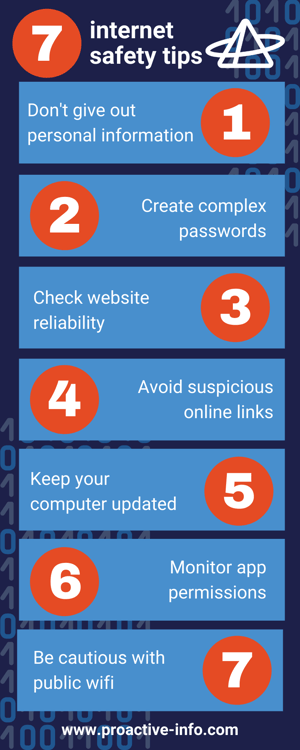The internet can be a dangerous playground for bad actors who will utilize social engineering, phishing scams, and ransomware, all designed to put your organization’s network and precious data at risk. As security breaches and data leaks become more and more prevalent, we thought it prudent to round up some tips to help keep you and your employees safely browsing.
Cybersecurity Tips
Don't Give Out Your Personal Information
Avoid online phishing scams attempting to get your personal information. Keep your private information just that: private. Don’t give out your phone number, social security information, or banking information to someone you don’t know.
If it appears to be a request from someone you know, shoot them a quick text or email to see what is going on. Because today’s hackers are so savvy, oftentimes their emails with malicious links look legitimate. If an email looks suspicious, it usually is. Does your CEO usually email you about her favorite weight loss tips? Probably not.
Create Complex Passwords
pim recommends you create a password with at least 12 characters, comprised of letters, numbers, and symbols. This will increase the time it takes for a hacker to guess your password. Consider also using password managers to create and keep track of your passwords so that each password for each account is unique.
Make sure to also update your passwords often. pim recommends updating your passwords at least every 90 days. One of the easiest ways hackers get your information is by getting a batch of usernames and password combinations from one source and trying those same combinations elsewhere. For example, if your Little Caesars account gets hacked and it is the same password you use for your banking, your work log-in, and your DoorDash account, you should assume that all those accounts are now hacked. (So not only is the employee’s information now unsecure, but it is possible their workplace is at risk as well!) By having individual passwords for every account, you can prevent a domino effect of data breaches. Remember the adage: Passwords are like underwear. Don’t share them and change them often.
Check Website Reliability

Before you purchase anything on a website or input your credit card information, ensure that it is safe. You can do this by checking if it has a small lock icon or “https” before the URL.
The “s” in “https” stands for secure and the lock means it is confirmed as a safe site by your browser.
Avoid Suspicious Online Links
Be careful of websites or emails containing suspicious links. Some websites may use quizzes, coupons, freebies or scandalous stories to get you to click on them and then steal your personal information.
Keep Your Computer Updated
Software companies and computer developers release updates to keep their products safe. Keep your device software up to date so that it is not vulnerable to malware.
Monitor App Permissions
Learn the privacy settings for any device, app or service that you may use. Some applications will ask for permission to access photos or location or other personal information. Stay informed so that you aren’t unintentionally sharing more than you intend.
Be Cautious with Public Wi-Fi
Be careful when you use public Wi-Fi. When accessing public networks, anyone can use unsecured networks to distribute malware and access private information. Only connect to private networks whenever possible, especially when handling your company’s sensitive information.